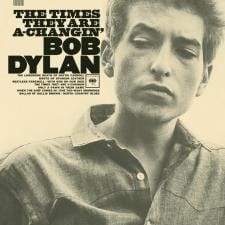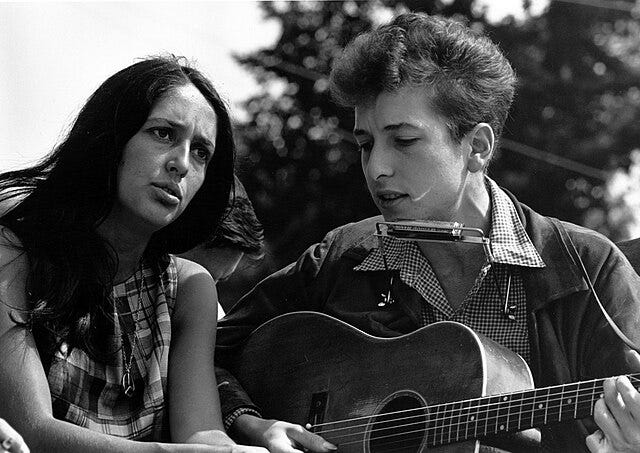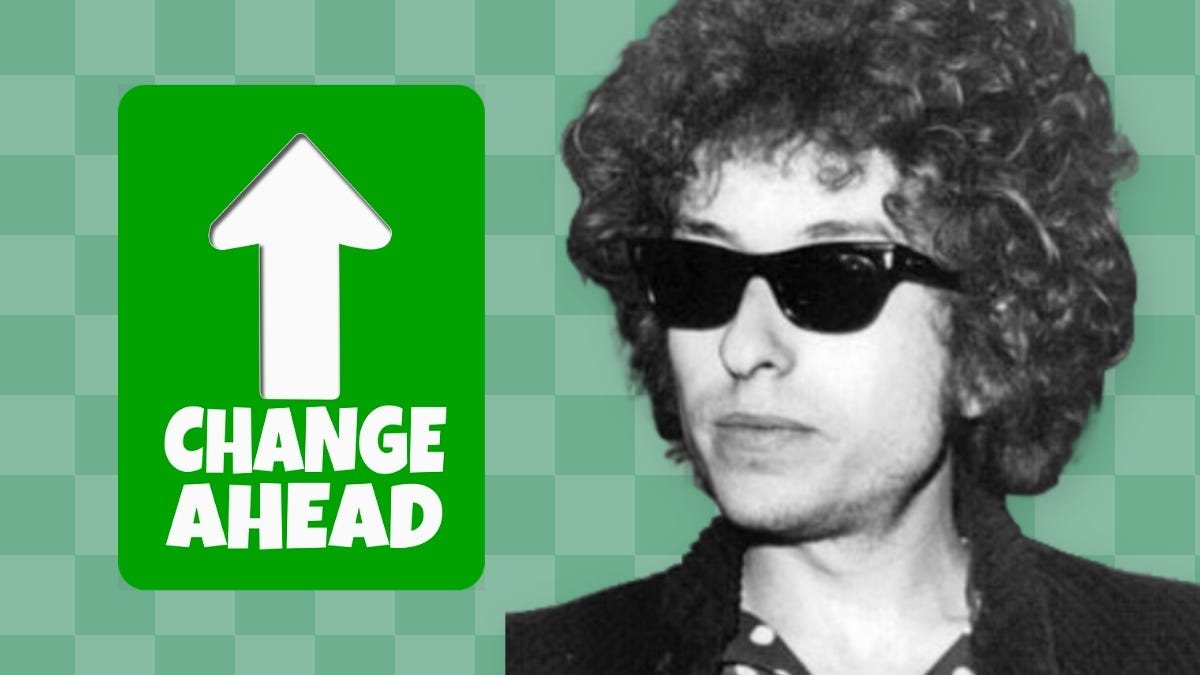Turbulent Times Call Out For A Classic: The Times They Are A-Changin'
Bob Dylan's clarion call during social and political upheaval remains relevant
Are we living in the 1960s? Again, for some of us.
Political and social upheaval runs rampant across the planet.
There is turmoil from the leftover Cold War hangovers in Ukraine, the Middle East is threatening to explode, and immigration deportation and government restructuring are causing greater riffs in the American populace.
The turbulent times of 2025 echo the counterculture and foreign wars of decades past.
History doesn't just rhyme and repeat - it blasts the same power chords over and over.
But it’s eerie when a 60-year-old protest song nails exactly what you're seeing on your news feed.
As the old proverb goes, “the more things change, the more they stay the same.”
Life usually repeats itself.
Today, we look at Bob Dylan's "The Times They Are A-Changin'" It remains a timeless anthem for those seeking progress and justice. The song captured the spirit of the 1960s, urging listeners to embrace change and challenge the status quo.
Changes Sweeping Through Society
Songs with a universal message can sweep through society at any time.
And common themes don’t even require translation: change, adaptation, social justice. It’s a timeless and repeatable list for a better world.
The end goals are clear: inspire empathy, create community and motivate the people.
"The Times They Are A-Changin'" is a classic clarion call to warn the status quo that change is on the way. It’s an uprising. It’s all-encompassing. And it’s swelling from the ground up.
Resistance is not an option. The waters are overwhelming.
And admit that the waters
Around you have grown
And accept it that soon
You'll be drenched to the bone
The song was released in 1964, during a period witnessing the atrocities related to the Civil Rights Movement, civil unrest and a growing anti-war sentiment to the conflict in Vietnam.
The battle outside ragin'
Will soon shake your windows
And rattle your walls
Dylan sensed the growing satisfaction with the establishment class. He urged everyone from congressmen to critics and politicians to parents to accept the new realities.
Come senators, congressmen
Please heed the call
Don't stand in the doorway
Don't block up the hall
The Movement was youth-led. It was time for action, not acquiescence. The new generation was fighting both abroad and at home.
Come mothers and fathers
Throughout the land
And don't criticize
What you can't understand
Your sons and your daughters
Are beyond your command
A Cultural Turning To The Future
We are not going back in time. We are speeding past the past.
Social justice is still front and center. The times have already changed. But the 1960s generation is now falling out of existence. Their moment wanes as the music still lingers on.
Gen Y and Gen Z are taking a stand and finding their own rhythms. The Boomers are way past their prime and the younger generations bore the brunt of their extravagant leadership.
Music played its usual subversive role, but it was the banning of TikTok that galvanized a national declaration of disobedience to the elders.
For a generation with nothing to hold on to, TikTok was the last straw. It represented the only thing they could call their own.
The whole episode illustrates that the “kids are alright” if we just get out of the way.


Talking ‘Bout My Generation
Let’s try to decipher how different generations interpret Dylan's "The Times They Are A-Changin'" through the lens of their unique social, political, and cultural contexts.
Here’s how different age groups perceive the song (aided by AI research):
Baby Boomers
The song's release during a time of significant social upheaval served as a rallying cry. They view the song as emblematic of their youth, representing a collective desire for change and a break from traditional norms. The lyrics resonate with their experiences of challenging authority.
Generation X
As the in-between generation, Xers interpret the song as a precursor to their own struggles against societal expectations. They connect to the themes of disillusionment and rebellion, just like in grunge and punk rock music. Plus, they reflect on their own economic uncertainty and significant cultural shifts.
Millennials
These are the Gen Ys, who grew up during the rise of digital technology and social media. They relate to calls for action against injustice and inequality and reinforces their values of inclusivity and progressivism.
Generation Z
Generation Z has never known a world without the internet. (WOW!) While they may appreciate the historical significance of old protest songs, their critique relates to not addressing contemporary issues directly. The old stuff lacks
a focus on intersectionality and global perspectives on social justice.
Overall, some songs resonate across generations and others will fall by the wayside. That’s the dilemma.
However, Dylan’s anthem remains relevant in a world embroiled in societal transformation, while phasing out the greatest influencers of the planet since the 1950s.
Coda
To show how the times are changing:
In July 2021, Dylan sold his entire recorded music catalog to Sony Music Entertainment. It also included the rights to future releases. The deal was estimated to be worth between $150 million and $200 million
That’s why we should revere the songs more than the artists. Artists retire with paychecks, we retire with their song memories.
As we navigate the complexities of the 21st century, 'The Times They Are A-Changin'' serves as a reminder that change is inevitable.
And that each of us has a role to play in shaping a more just and equitable world.
Let us embrace the spirit of this timeless anthem and continue to strive for better or worse.
Credits:
The Times They Are A-Changin' lyrics © Sony/ATV Music Publishing LLC
===================
If you like the songs and/or essays, please help me distribute them by sharing and following me on Twitter/X, Substack and now YouTube.
I appreciate your time and support in this endeavor.



